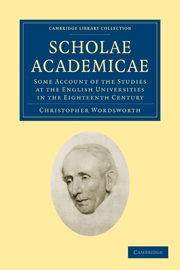 Scholae Academicae
Scholae Academicae Book contents
- Frontmatter
- PREFACE
- Contents
- CHAPTER I GENERAL INTRODUCTION
- CHAPTER II THE TRIPOS, name and thing
- CHAPTER III THE SOPHS' SCHOOLS before 1765
- CHAPTER IV ACTS AND OPPONENCIES after 1772
- CHAPTER V THE SENATE-HOUSE
- CHAPTER VI THE ADMISSION OF QUESTIONISTS. Huddling
- CHAPTER VII THE MATHEMATICKS
- CHAPTER VIII THE TRIVIAL ARTS
- CHAPTER IX HUMANITY
- CHAPTER X MORALS AND CASUISTRY
- CHAPTER XI LAW
- CHAPTER XII MODERN STUDIES
- CHAPTER XIII ORIENTAL STUDIES
- CHAPTER XIV PHYSICK
- CHAPTER XV ANATOMY
- CHAPTER XVI CHEMISTRY
- CHAPTER XVII GEOLOGY AND MINERALOGY
- CHAPTER XVIII BOTANY
- CHAPTER XIX The Degree of M.A.
- CHAPTER XX MUSICK
- CHAPTER XXI ASTRONOMY
- CHAPTER XXII CONCLUSION
- APPENDICES
- INDEX
CHAPTER IX - HUMANITY
Published online by Cambridge University Press: 07 September 2010
- Frontmatter
- PREFACE
- Contents
- CHAPTER I GENERAL INTRODUCTION
- CHAPTER II THE TRIPOS, name and thing
- CHAPTER III THE SOPHS' SCHOOLS before 1765
- CHAPTER IV ACTS AND OPPONENCIES after 1772
- CHAPTER V THE SENATE-HOUSE
- CHAPTER VI THE ADMISSION OF QUESTIONISTS. Huddling
- CHAPTER VII THE MATHEMATICKS
- CHAPTER VIII THE TRIVIAL ARTS
- CHAPTER IX HUMANITY
- CHAPTER X MORALS AND CASUISTRY
- CHAPTER XI LAW
- CHAPTER XII MODERN STUDIES
- CHAPTER XIII ORIENTAL STUDIES
- CHAPTER XIV PHYSICK
- CHAPTER XV ANATOMY
- CHAPTER XVI CHEMISTRY
- CHAPTER XVII GEOLOGY AND MINERALOGY
- CHAPTER XVIII BOTANY
- CHAPTER XIX The Degree of M.A.
- CHAPTER XX MUSICK
- CHAPTER XXI ASTRONOMY
- CHAPTER XXII CONCLUSION
- APPENDICES
- INDEX
Summary
Homo sum: humani nil a me alienum puto.
Terence, Hauton Timorumenos, 1. i. 25.There is, or there was, a common opinion which assigned to Oxford exclusively the study of Classics, and to Cambridge the sole pursuit of Mathematics.
The truth amounts to this, that since the Revolution and until the first quarter of the present century was waning, a degree could hardly be obtained at Cambridge without some application to geometry at the least, while at Oxford mathematical knowledge or skill won no academical distinction until our own time.
On the other hand, to speak of Cambridge as even by comparison the non-classical university, represents a gross misconception.
If the Great Rebellion had put a period to the colloquial use of the latin language in college halls and walks, we find it restored as the medium for college lectures, examinations and declamations, and for the public disputations, without which no degree could under ordinary circumstances be acquired. Until quite recently, no student of Trinity was accepted as candidate for a foundation-scholarship until he had written a latin epistle to the master, nor was any admitted without some knowledge of greek. Until 1 Oct. 1869 all academical graces were expressed in the former language, of which we still have traces in the words supplicat, placet, bene discessit, licet migrare, &c., as the Cambridge undergraduate vocabulary contains optime, exeat, redit, aegrotat, and in past times had dormiat, descendas; as the Oxonian keeps testamur.
- Type
- Chapter
- Information
- Scholae AcademicaeSome Account of the Studies at the English Universities in the Eighteenth Century, pp. 90 - 119Publisher: Cambridge University PressPrint publication year: 2009First published in: 1877
